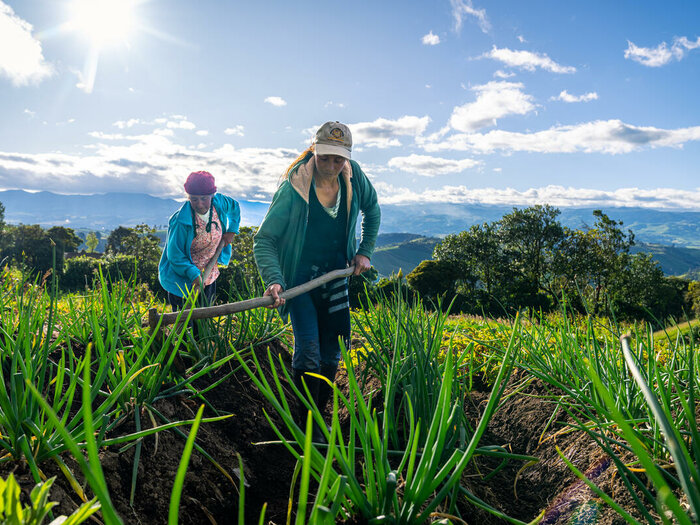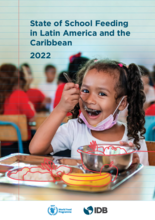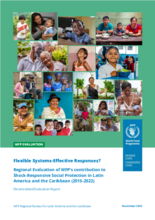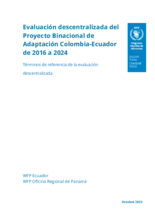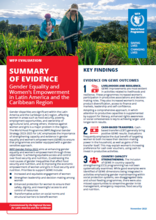Ecuador
- 40%
- of the rural population lives below the poverty line
- 70%
- of women are engaged in rural family farming
- 18.4 million
- population
Ecuador, as an upper-middle-income country, is receiving decreased humanitarian funding from donors. The World Food Programme (WFP) and its partners face challenges securing funds for the country's social protection system – which is crucial given the socioeconomic challenges posed by migration and the lingering impacts of the pandemic.
In 2022, Ecuador faced complex economic, political and social challenges, compounded by deteriorating security and the effects of climate change. While poverty rates decreased from 28 percent in 2021 to 25 percent in 2022, and the country experienced 3 percent year-on-year GDP growth in the third quarter of 2022, inflation, the repercussions of the Ukraine crisis and social unrest led to an increase in food insecurity among both nationals and migrants.
What the World Food Programme is doing in Ecuador
-
Food assistance and nutrition
-
WFP provides vital food assistance to over 300,600 refugees, migrants and individuals suffering from severe food insecurity in Ecuador. Cash-based transfers are used to reach people in vulnerable situations, spanning border areas to urban centres and remote regions with higher rates of malnutrition and poverty. WFP also raises people’s awareness of food security and nutrition. Priority is given to pregnant/breastfeeding women and children under 2, with a focus on complementing local social-protection systems.
-
End malnutrition
-
WFP works with the Government of Ecuador to fight against malnutrition, focusing on a nutrition-sensitive approach to social protection policies and programmes. WFP's support is rooted in research and implementing innovative initiatives such as decentralized school-meal models. These efforts involve smallholder farmers producing fresh and healthy food to prevent and reduce chronic child malnutrition. WFP also promotes communication activities that drive behavioral changes, encouraging healthy eating habits while considering gender and nutrition aspects. The organization also ensures access to knowledge and resources for communities in vulnerable situations, thereby enhancing their nutritional status.
-
Sustainable food systems
-
WFP supports Government efforts to build food systems that are nutritious, inclusive, and sustainable, while also enhancing resilience against the effects of climate change. To achieve this, WFP is implementing innovative initiatives, such as rice cultivation with ducks, agro-ecological farm development, the design and implementation of nature-based (ecosystem) and community-based adaptation measures to reduce the risk of climate-induced hunger and malnutrition. These transformative approaches also have a focus on gender and nutrition, to strengthen the livelihoods of communities and family farmers based on their ancestral knowledge.
-
Capacity strengthening
-
WFP is committed to supporting national and local institutions in fighting food insecurity, malnutrition and emergencies. This includes strengthening social-protection systems by promoting collaboration and knowledge-sharing, disseminating research results and fostering South-South cooperation. In addition, through our supply-chain operations, WFP implements activities including capacity needs mapping, preparedness workshops and simulation exercises, to strengthen logistics capacity.
-
Emergency preparedness
-
WFP plays a crucial role in supporting emergency preparedness in Ecuador. By combining expertise, partnerships and evidence-based forecasting, WFP enhances institutions' and communities' capacity to respond to emergencies and minimize their impact on people in vulnerable situations. WFP promotes coordination among public entities and local communities in establishing shock-responsive social-protection mechanisms. Drawing from the lessons of the COVID-19 response, WFP Ecuador Supply Chain strengthens logistics coordination at national, regional and local levels through the National Logistic Group, aligning with the Institutional Capacity Strengthening initiative.
-
Service provision
-
WFP in Ecuador enhances supply-chain operations, identifies improvement areas for governments and humanitarian partners, and offers services such as procurement, logistics, cash-based transfers, engineering and administrative support. This allows partners to concentrate on strategic activities while receiving transparent and efficient results. Additionally, WFP strengthens logistics coordination, operational processes, and emergency preparedness of partners, to optimize supply chains and improve efficiency.
Ecuador news releases
Go to pagePartners and donors
Find out more about the state of food security in Ecuador
Visit the food security analysis pageOperations in Ecuador
Contacts
Office
Avenida Mariana de Jesús Oe7-02 y Nuño de Valderrama. Edificio Citimed. Piso 8
Quito
Ecuador

